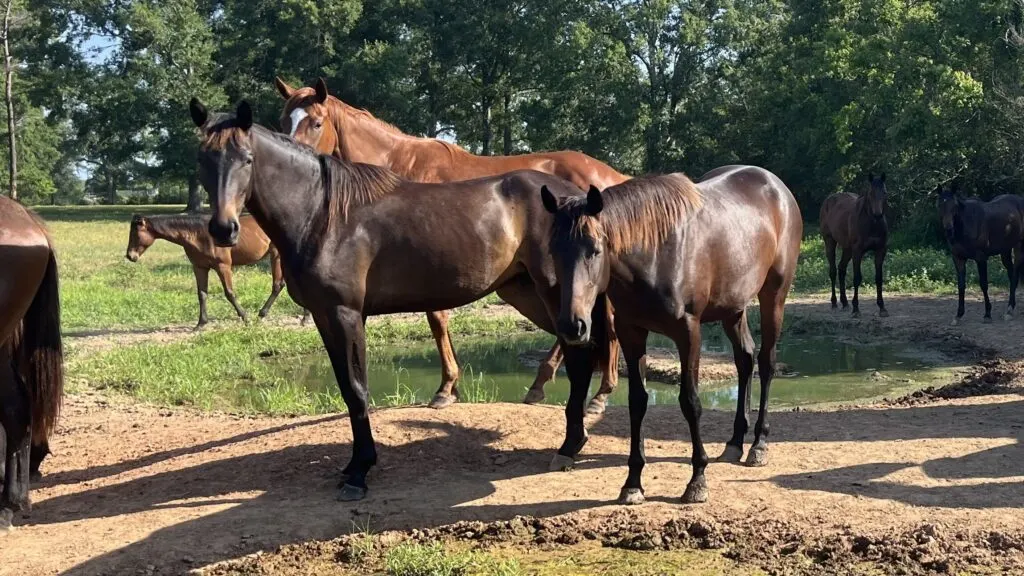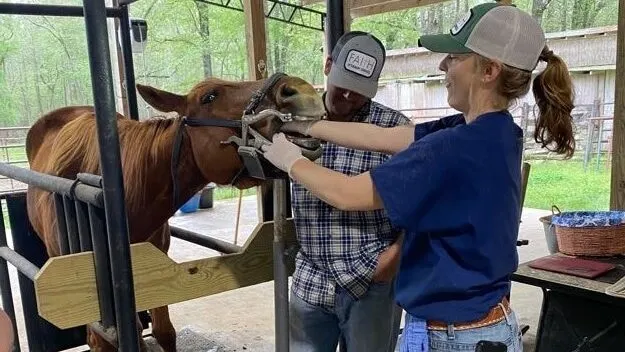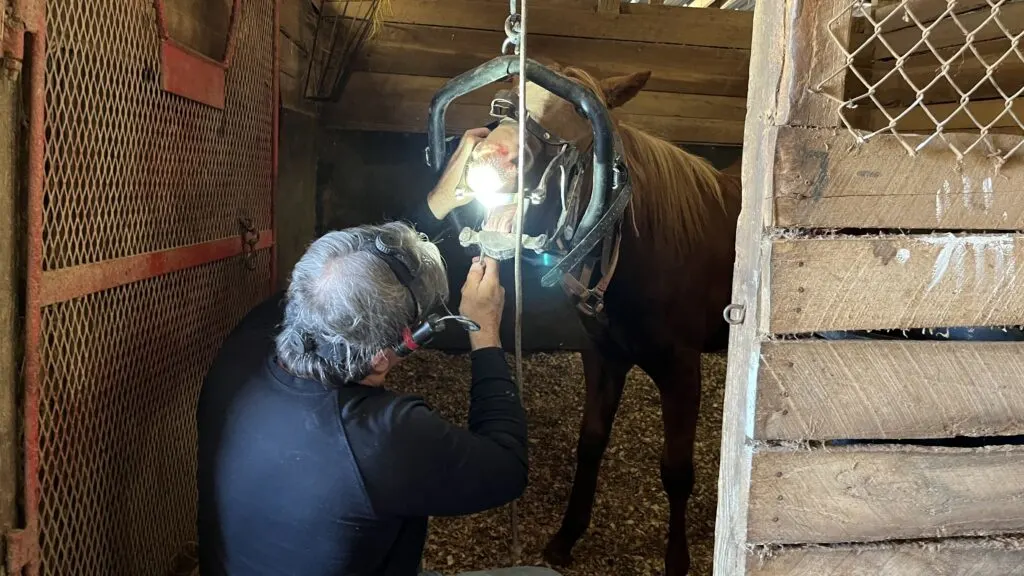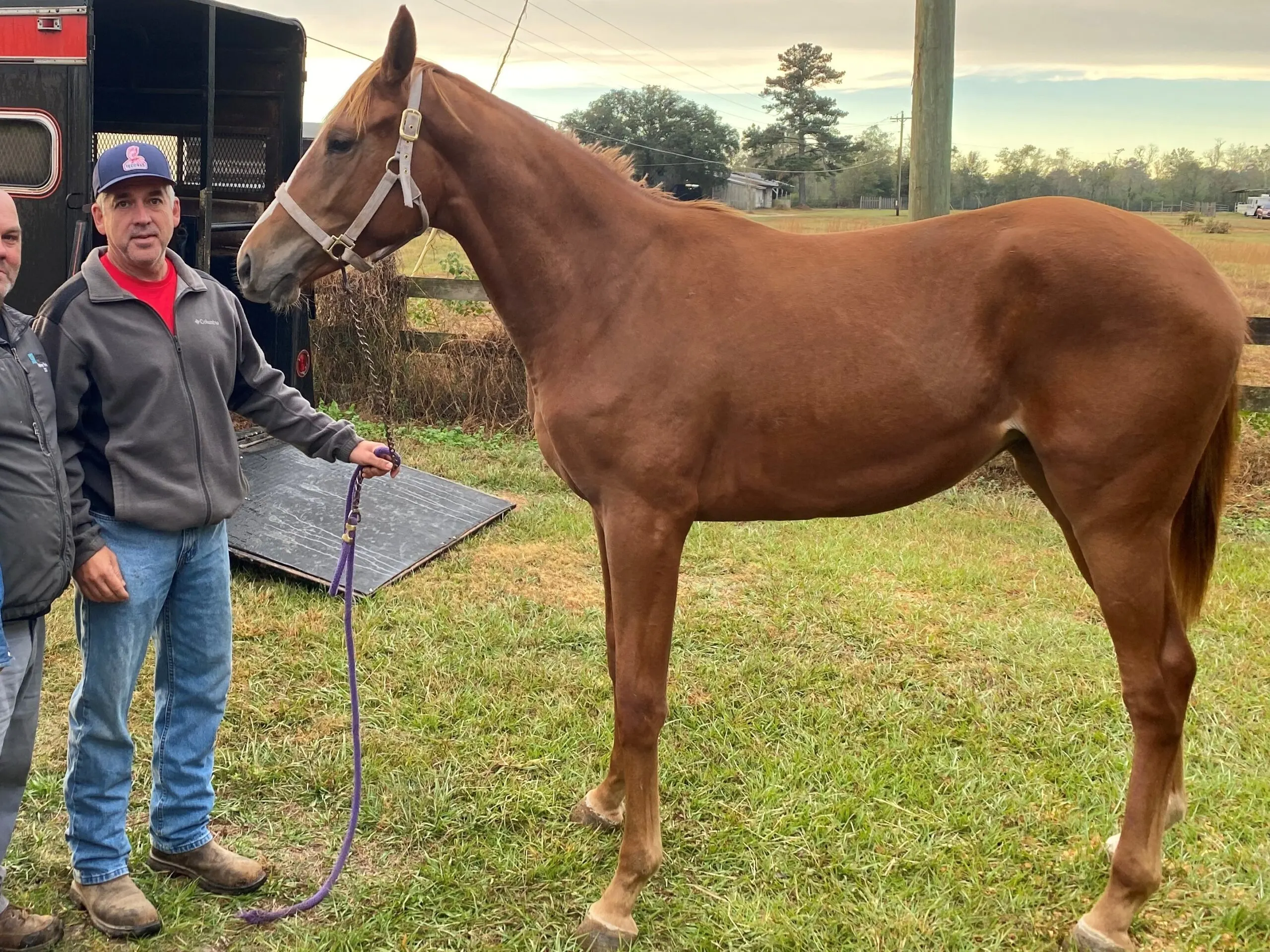Last updated: August 28, 2023
Any links on this page that lead to products on Amazon are affiliate links and I earn a commission if you make a purchase. Thanks in advance – I really appreciate it!
The sight of a horse drooling, with strands of saliva hanging from its mouth, can be unsettling for some and merely curious for others. Yet, this isn’t just an aesthetic concern; equine salivation plays a pivotal role in a horse’s overall health and well-being.
Saliva aids in digestion, maintains oral health, and contributes to the horse’s overall comfort. But when drooling becomes excessive, potential causes can range from grass sickness, poisoning, and infections to dental issues or the results of strenuous work.
In this article, we’ll dive deep into the world of equine salivation. As horse owners, understanding why a horse drools and discerning what amount is normal is crucial for the well-being of our equine companions.

Normal vs. Excessive Salivation
Salivation is not merely an afterthought in the world of equines; it’s a crucial physiological process. Understanding the difference between normal and excessive salivation can be the key to ensuring the well-being of your horse.
Role of Saliva
- Digestion: Saliva contains enzymes that initiate the breakdown of food, turning complex starches into simpler sugars. This early digestive process starts in the mouth, preparing the food for further digestion in the stomach and intestines.
- Oral Health: Saliva acts as a natural cleanser, washing away food particles that could lead to tooth decay or gum disease. It also provides lubrication, preventing friction that could cause oral sores or ulcers.
- Temperature Regulation: While not its primary role, saliva can aid in cooling a horse, especially when they froth at the mouth during rigorous activities like galloping or jumping.
Causes of Normal Salivation
Regular drooling is often a direct response to certain stimuli or conditions. For instance:
- Presence of Food: Just as humans might salivate at the sight or smell of tasty food, horses can produce more saliva in anticipation of or during eating, especially with certain feeds or fresh grass.
- Natural Behaviors: Grooming, exploring their surroundings, or mouthing objects can also stimulate salivation.
- Relaxation: Some horses might drool slightly when they are extremely relaxed or dozing.
Recognizing Excessive or Abnormal Drooling
While a little drool now and then is nothing to fuss over, there are instances when excessive salivation is a cause for concern:
- Consistency: Thick, ropey saliva or drool tinged with blood can indicate potential issues.
- Frequency: If your horse is drooling continuously, even without the typical triggers like food or relaxation, it’s a sign that something might be amiss.
- Accompanied Symptoms: If excessive drooling is paired with other signs of distress—like refusal to eat, facial rubbing, or swelling—it’s crucial to consult with a veterinarian.
By distinguishing between normal and excessive salivation, horse owners can be proactive in addressing potential health concerns, ensuring their equine friends stay healthy and comfortable.

Common Causes of Excessive Drooling in Horses
Horses might drool for a variety of reasons, but when it becomes excessive, understanding the underlying cause is paramount. Let’s delve into some of the common culprits:
Grass sickness
Grass sickness is probably the worst-case scenario for excessive drooling. The exact cause of this problem isn’t known, but the results are. It affects the nervous system, causing paralysis in the gut.
The horse can’t swallow the saliva, and this is often fatal. It is more common in Northern Europe and Great Britain than elsewhere, but it can occur anywhere.
Plants and Toxicity
There is more than one toxin that can cause excessive drooling in horses. One is sometimes found in clover, although it isn’t the clover itself that poses the problem. Instead, it is the host for a parasitic growth that will cause slobbers, the illness named for the results of a horse eating it.
Slobbers aren’t a harmful disease and will go away on their own. Fields that have been sprayed with pesticides also pose a serious threat to horses and other animals. Some states have banned the use of pesticides on land that produces livestock feed.
Banning pesticides can help prevent this sort of poisoning; however, if the horse has already eaten it, you will need to contact the vet. Ragwort, which is a bane to those of us with hay fever, can also be toxic to horses. There is a tool called a ragwort fork that can help rid your paddock or pasture of this threat.
If you have an allergy to the plant, it would be wise to either wear gloves, masks, and goggles or get someone who isn’t allergic to clear it for you.
Oral Lesions and Trauma
Whether it’s from a heavy-handed rider or the horse chewing on something that causes damage to the mouth, an oral injury can cause drooling. You’ll need to check the mouth carefully, both inside and out, to see if something is causing the problem. Once found, rest from the cause will help it heal.
If you have allowed someone else to ride your horse and they are responsible for this, you may want to see that they get educated on using the reins properly.
The most painful bit on the planet is any bit in the hands of someone who uses it too harshly. This is as much for the rider’s benefit as the horse’s. Some horses will not take kindly to less gentle handling and may well toss the rider.

Dental problems and Equine Drool
Anyone who’s experienced a toothache can attest to the discomfort it brings. Similarly, when horses face dental issues, it can result in noticeable changes, such as excessive drooling. A thorough check of the horse’s dental health can sometimes provide insights into the underlying cause of the salivation.
- Tooth Abscesses: Similar to how bacterial infections in our teeth can be painful and problematic, horses can develop abscesses leading to increased drooling.
- Sharp Enamel Points: Think of these as tiny spurs on the teeth. They can irritate the horse’s tongue and cheeks, causing oral ulcers and resulting in excessive salivation.
- Misaligned Teeth or Dental Malformations: Just as misaligned teeth in humans can affect our bite and chewing, horses with dental malformations may drool more due to their inability to chew properly.
If you suspect dental issues, it’s recommended to consult an equine dentist. Attempting to handle dental problems without expertise can be risky, both for you and the horse. While horses are generally gentle creatures, pain or discomfort can lead to unpredictable reactions, making professional intervention crucial for safety.
Infection
Excessive drooling paired with bad breath in your horse might indicate an underlying infection. Just as in humans, infections in a horse’s mouth or throat can result in discomfort and symptoms like drooling.
It’s vital to consult with a veterinarian for a diagnosis and appropriate treatment. While humans often turn to certain herbs or antibiotics to combat infections, these remedies might not always be suitable for equines. The specific treatment will depend on the type of infection identified.
For instance, diseases like Strangles and Vesicular Stomatitis can cause swelling or lesions in the horse’s mouth. These conditions, among others, can lead to noticeable increases in saliva production.
Emotions
Both excitement and fear can cause excess salivation in horses. For fear, it starts because the startle response in horses causes their mouths to go dry. When they calm down, they produce excess saliva to rehydrate their mouths. This is absolutely normal.
Morning sickness
Pregnancy does a lot of weird things to the female mammal. Hormones are released that can play hob with emotions and cause stomach difficulties. These are most common in the first third of the pregnancy. Your vet can tell you what to do to help keep the mare comfortable.

Medications and Horse Drooling
When we humans take certain medications, we often look out for potential side effects, and dry mouth or increased salivation are common ones. Similarly, horses aren’t exempt from the side effects of treatments they undergo.
If you’ve noticed unusual drooling patterns after your horse has started a new medication or received a particular treatment, this could very well be the reason. Always consult with a veterinarian regarding any potential side effects, especially if they seem to be affecting your horse’s comfort or behavior. The right adjustments or alternatives can make all the difference in ensuring the well-being of your equine companion.
Summer
Weather can play a role in how much a horse drools. They lose some of the body heat caused by hot weather through the creation of extra saliva. A horse will need access to fresh water and a cool place to stay in the heat in order to avoid heat-related illnesses.
Increased work
The more the horse is called on to do, the more it will create excess saliva. It is common to see and perfectly normal. Remember that if a horse is overwarm after a workout, it needs to cool down before heading for a water drink. Losing saliva from work will make it want to drink.
Neurological Causes
If your horse starts drooling excessively or abnormally, an underlying neurological cause might be at play. It’s essential to recognize that these imbalances in saliva production can be linked to more significant neurological issues.
Consulting with a veterinarian is paramount in these situations, as they can provide a comprehensive evaluation and suggest appropriate treatments or interventions to address the root cause.
Rare Causes of Excessive Drooling
There are, however, some rare reasons for excessive drooling in horses. One such cause is the Borna Virus, a rare but serious condition resembling the effects of polio. Most transmissions of this virus occur through the urine of infected animals, and it is often fatal upon contraction.
Equine viral arteritis is another potential culprit. This virus primarily affects mares, and transmission commonly occurs through mating. An infected pregnant mare stands a high risk of abortion due to the incompatibility of the disease with pregnancy. Thankfully, a vaccine is available in the U.S. to mitigate the risk.

Assessing a Drooling Horse
When faced with a horse that’s drooling excessively, a comprehensive assessment is crucial. This not only aids in understanding the root cause but also ensures that the horse receives timely and appropriate care.
1. Physical Examination
Before jumping to conclusions, always begin with a detailed physical examination.
- Inspecting the Horse’s Mouth and Dental Structure: Much like humans, horses can suffer from various dental issues. By examining the dental structure, you can identify problems such as misaligned teeth, sharp enamel points, or other dental malformations that might be causing discomfort and drooling.
- Looking for Signs of Oral Trauma or Foreign Objects: Foreign objects like sticks, bristles, or even certain foods can become lodged in a horse’s mouth, leading to drooling. Inspecting the oral cavity can also reveal any cuts, ulcers, or other forms of trauma that might be the culprit.
2. Behavioral Observations
Observing your horse’s behavior can offer valuable insights into potential issues.
- Changes in Eating or Drinking Habits: A drooling horse might find it painful to eat or drink, leading to reduced intake or a complete avoidance of food and water.
- Facial Rubbing or Other Signs of Discomfort: If a horse frequently rubs its face against surfaces or shows other signs of distress, it’s indicative of discomfort or pain, which could be linked to excessive salivation.
3. Veterinary Diagnostics
When initial assessments don’t provide clear answers, it’s time to call in the experts.
- Blood Tests: These can indicate systemic issues or infections that might be causing the drooling.
- Oral Swabs: Useful in identifying any bacterial or fungal infections within the mouth.
- X-rays: Dental X-rays, in particular, can reveal hidden issues within the jaw or teeth that might not be immediately visible through a standard physical examination.
Remember, while it’s essential to understand the potential causes of excessive drooling, always consult with a veterinarian for a comprehensive diagnosis and appropriate treatment plan.
Treatment and Management of a Drooling Horse
When faced with a drooling horse, it’s essential to address not just the symptoms but the underlying causes. A comprehensive treatment and management plan ensures the horse’s overall well-being and reduces the chances of the issue reoccurring.
1. Addressing the Underlying Cause
- Dental Care: Regular dental check-ups and treatments are crucial. Sharp enamel points, misaligned teeth, and other dental issues can be identified and corrected by an equine dentist, ensuring the horse’s mouth remains healthy and comfortable.
- Removing Toxic Plants: Ensure that the horse’s grazing area is free from toxic plants known to cause drooling, such as certain types of clover. Regularly inspect and clean their feed and ensure it’s free from contaminants.
2. Medications and Interventions
- For Infections or Diseases: If the excessive drooling is caused by bacterial or viral infections, appropriate antibiotics or antiviral medications will be prescribed. It’s crucial to follow the vet’s guidelines and complete the course of treatment.
- For Neurological Causes: Medications may be provided to address imbalances in the nervous system, especially if they’re causing disruptions in salivation.
3. Providing Comfort
- Soft Diets: If a horse is showing signs of oral discomfort, switching to a soft diet can help. Mashes or soaked hay can be easier for the horse to chew and swallow, reducing discomfort and drooling.
- Pain Management: Over-the-counter or prescription pain medications, under the guidance of a vet, can help alleviate pain, especially if the drooling is a result of oral trauma or dental issues.
4. Preventative Measures
- Regular Check-ups: Scheduling regular vet visits can help catch and address issues before they become more severe.
- Safe Environment: Ensure that the horse’s living and grazing areas are free from potential hazards like sharp objects or toxic plants.
- Awareness: Stay informed about common causes of excessive drooling in horses and be observant of any changes in your horse’s behavior or physical condition.
Every horse is unique, and what works for one might not work for another. It’s essential to collaborate closely with a veterinarian to devise a treatment and management plan tailored to your horse’s specific needs.

Nasal Discharge and “Choke” in Horses
Nasal discharge in horses can be alarming and often indicates a potentially serious issue. One such problem is when food becomes lodged before reaching the stomach, leading to a condition known as “choke.” This situation is particularly concerning for horses, as unlike humans, they cannot vomit to clear obstructions. As a result, intervention from a veterinarian becomes essential.
An unusual related incident comes to mind. Once, out of the blue, I noticed one of our horses had developed white foam on his muzzle and in front of his stall. Puzzled by this rare occurrence, I consulted a vet. Surprisingly, he, too, had never encountered such a condition before and was at a loss.
As days went by, we observed the horse more closely. We noticed he had a peculiar behavior of pressing his neck against the stall gate and inhaling sharply. This action seemed to produce the mysterious white foam. As a preventive measure, we tied some string across the gate to discourage him from sticking his head out, and sure enough, the foaming stopped.
Below is a helpful YouTube about drooling caused by eating clover.
Conclusion
The well-being of our equine companions hinges greatly on our attentiveness and proactive care. Detecting issues early on can not only alleviate discomfort for the horse but also prevent potential complications down the line.
Excessive drooling, while sometimes just a benign occurrence, can be a red flag pointing toward more serious health concerns. Regular check-ups with a veterinarian are invaluable. They ensure that any developing issues, be they dental problems, infections, or other conditions, are caught and addressed promptly.
Moreover, as horse owners or caretakers, it’s crucial for us to be observant, picking up on any subtle changes in our horse’s behavior, eating habits, or physical appearance. While a drooling horse might sometimes merely be responding to a tasty treat or a new sensation, it’s essential to remember that it can also be a sign of a more pressing health issue.
By staying informed, observant, and proactive in our care approach, we can ensure that our horses lead comfortable, healthy lives. Always prioritize their well-being and never hesitate to seek expert advice when in doubt.
Resources:
- https://www.sciencedirect.com/science/article/abs/pii/S0749073917300974
- https://equusmagazine.com/diseases/why-is-my-horse-drooling-8549
- https://www.thesprucepets.com/slobbers-or-slaframine-poisoning-in-horses-1886006
Meet Miles Henry
An avid equestrian and seasoned racehorse owner, Miles Henry brings his extensive experience to the equine world, proudly associating with the AQHA, The Jockey Club, and various other equine organizations. Beyond the racetrack, Miles is an accomplished author, having published various books about horses, and is a recognized authority in the field, with his work cited in multiple publications.
🔗 Connect with Miles:
Twitter
Facebook
YouTube: Check out race highlights, horse care tips, and more!

